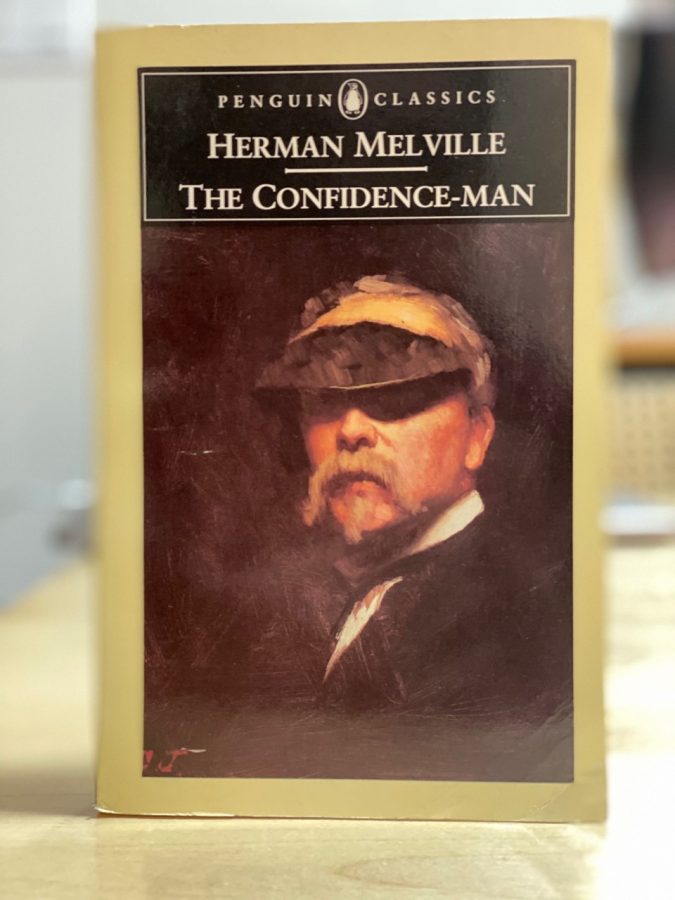The Nature of Truth and Fiction in Herman Melville’s ‘The Confidence-Man: His Masquerade’
‘The Confidence Man’ is the ninth book and final novel by American writer Herman Melville. Scholar Robert Milder noted, “Long mistaken for a flawed novel, the book is now admired as a masterpiece of irony and control, although it continues to resist interpretive consensus.”
Stumbling through the dry-river basin of the east, by the sea, he implores the summer to cease its overbearing heat. His soul is troubled by the reverberations of the nonsensical call of gulls that loiter about. He leans against the cold railings of the broken boardwalks, falls asleep, and soon after doing so, he awakes with nauseous shudders and throws himself onto the beach. Face first, muffled by the heat, he begins to wail in indecipherable words. Longing for the end of endless quarrels, for the squalls to cease, he prays for that the chance that soon it will drop but one bit of rain. All with confidence.
With the passing of the centennial of the Melville revival, which first began in 1919, one hundred years after Herman Melville’s birth in 1819, the author’s influence upon American literature is profound. From William Faulkner to Ralph Ellison to Thomas Pynchon, Melville’s thunderous writings have influenced successive generations of writers the world over, especially in America. Yet outside of the literary world, other than ‘Moby Dick,’ ‘Billy Budd,’ or ‘Bartleby, the Scrivener,’ Melville’s works are rarely discussed.

A little known work by Melville, ‘The Confidence-Man: His Masquerade,’ was published, peculiarly, on April 1st, in the year 1857. It was described by contemporary reviewers as, “dogmatizing, theorizing, philosophizing and amplifying upon every known subject… in the most eccentric and incomprehensible manner.” Through the novel is full of “innumerable forms,” the book stands wrapped in an enigmatic cloak of disguise. To describe the late works of Melville succinctly, especially one so hushed as ‘The Confidence-Man,’ is perhaps a lost cause. For were I merely to say, “the most elemental aspect of ‘The Confidence-Man’ is that it follows several monetary exchanges between individuals on a ship called the Fidèle,” I have already lost the entire scope of the book’s mystery, instead breaking it down into a useless philosophy. Let us instead focus upon only one of those aforementioned exchanges in this book.
In Chapter 4, entitled ‘Renewal of Old Acquaintance,’ we are introduced to a man with a weed on his hat, along with a country merchant named Mr. Roberts.
‘“How do you do, Mr. Roberts?’
‘Eh?’
‘Don’t you know me?’
‘No, certainly.”’
So begins the exchange between the two, the man with the weed claiming to have known Mr. Roberts from before. “‘Is it possible, my dear sir,’’ resumed he with the weed, ‘that you do not recall my countenance?’” “‘In my conscience—truly—I protest,’ honestly bewildered.” Has Mr. Roberts forgotten about the time that he met the man with the weed at Brade Brothers & Co.’s office? And that he forced the man with the weed to come home for a family tea? Has he forgotten about the urn, what the man with the weed said about Werter’s Charlotte, the story Mr. Roberts then told of the large loaf? And have we forgotten the man with the weed’s name? ‘“Ringman, John Ringman.”’
‘“Large loaf? Invited you to tea? Ringman? Ringman? Ring? Ring?’”
Perhaps, as Mr. Ringman suggests, Mr. Roberts has hit his head since then and has forgotten Mr. Ringman because of that. Or, after Mr. Roberts lets it slip, due to a case of brain fever. After all, have we not heard of stories, research even, in which a person wakes after being knocked in the head or after recovering through a severe brain illness only to find that he cannot remember his own name? Perhaps.
With all of their conversation aside, Mr. Ringman arrives at his final purpose — to ask Mr. Roberts for money. “The merchant started, apparently, almost as if to retreat.” Mr. Ringman stops the merchant and offers his tragic story, which he painfully recounts as the merchant listens. “As the story went on, he drew from his wallet a bank note, but after a while, at some still more unhappy revelation, changed it for another, probably of a somewhat larger amount.” Afterward, alms being given, the two diverge.
Was Mr. Roberts just conned? Has Mr. Ringman lied to Mr. Roberts about their past correspondence? After all, did they not ever meet each other before? And has Mr. Ringman just come up with a sorrowful fiction in order to gain charity through deceit? “‘Pardon me, but you must admit, that just now, an unpleasant distrust, however vague, was yours. Ah, shallow as it is, yet, how subtle a thing is suspicion, which at times can invade the humanest of hearts and wisest of heads.”’

“‘Charity endureth all things… Charity believeth all things… Charity never faileth.’” These three tenets, presented by a mute, Christ-like figure at the beginning of the novel, are the coordinates by which the ship Fidèle’s course follows. For charity to exist, a man must have confidence in his fellow man, no matter the situation, unless he wishes to be mistaken for a misanthrope. It is through confidence in his fellow man, Mr. Ringman, that Mr. Roberts is able to provide charity.
‘“That’s your Confession of Faith, is it? Confidence in man, eh?’” you may sound as did a character in this book, “‘don’t knaves munch up fools just as horses do oats?’” To which, a herb-doctor of this book would reply, “‘I was to have taken you seriously, in your droll conceits, too, about having no confidence in nature. In reality you have just as much as I have.’” In believing that your fellow man will betray you, you already assign a degree of confidence to your fellow man.
Why do you feel such a distrust for this man with the weed anyhow? Is it due to the title of this novel? Is it due to the publication date? Is it because the ship’s name, Fidèle, is French for the ship of fools? Melville provides no concrete indication that any of the characters within this book have been conned. You must have instead presumed that for yourself.
Yet while we read the novel, exploring similar questionable transactions occurring between other characters, drowned in philosophical discourse, we thereby find ourselves flailing, questioned in our beliefs at every angle, realizing that all rationality, all logic, is absurd. We struggle and gasp at the thought: “is not everything but a play of confidence?” Beware of the conclusions that you make upon your discovery, for when you see an ailing man hurt on the street, do not say to yourself, “how am I to believe that he is truly sick? What if this is merely an act? There is no truth!”
Why do you believe in certain people and not others? Is it science? Why do you believe in science? Why do you believe that cells exist if they are invisible to the naked eye? Why do you believe that what you are seeing through that microscope is a cell and not a circle? Other people have told you that there are cells? Other people have told you that there are atoms? Have not other people at one time told you that the media cannot be trusted? And vice versa?
Why do you believe that a piece of paper will be set on fire if set on a stove? Is it not possible to imagine the paper not being set ablaze? How can you be so certain? Memory? Past experiences suggest to you that this is the case? How much can you trust your memory? Might you not have had a brain fever? Have you hit your head? Why do you have confidence in what is said to you by your friends? How can you have confidence in what is said in your family?
Why is it that as you try to rationalize it, you only prove your own blind confidence? Why do you even have confidence in what I have said about this book? How can you have confidence in me? “Tell me, how?”
“Well, I don’t know… I simply do,” thus spoke Ethan Zakharov ’21.

“Well, I don’t know… I simply do,” thus spoke Ethan Zakharov ’21.
Fahim Zaman is a Staff Reporter for ‘The Science Survey.’ He enjoys journalistic writing due to being fascinated by the thought of exploring various...

